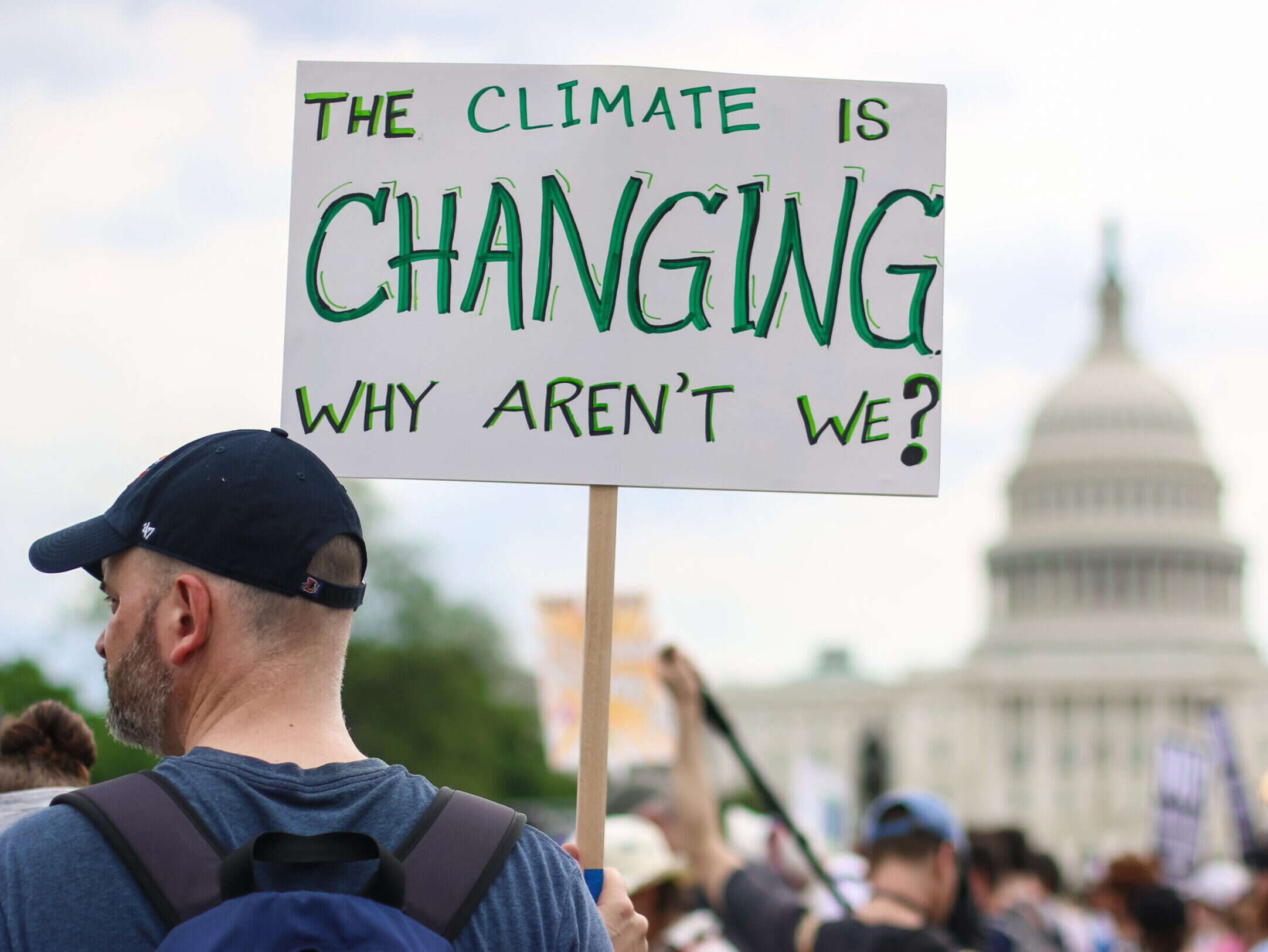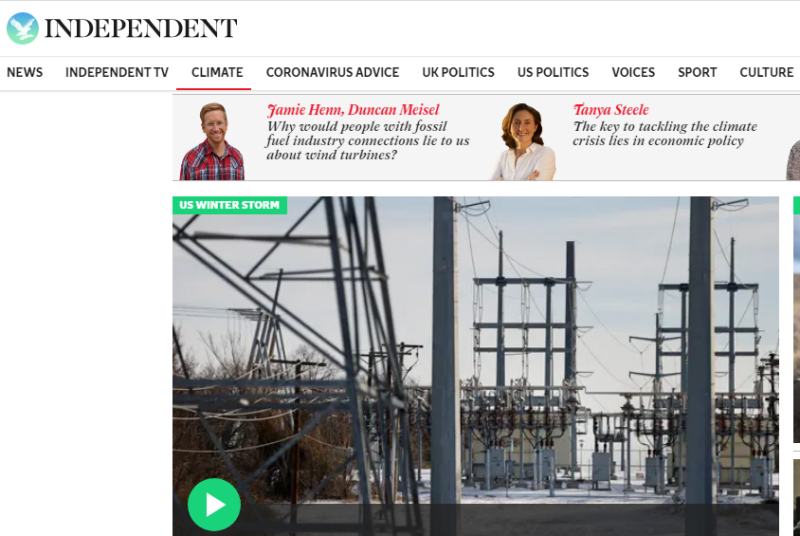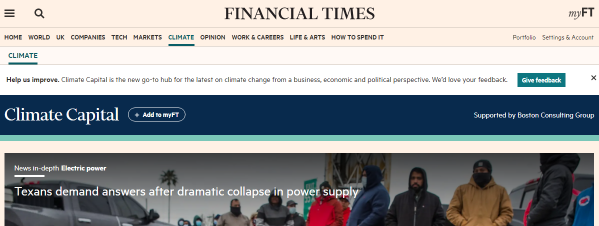
The years 2020 and 2021 were always going to be big years for climate change coverage in the UK media according to Christian Broughton, managing director of The Independent.
Broughton claimed there have been three phases of climate journalism in the British media: the first with a focus on whether to believe what the scientists were saying and the second about the “nitty gritty” of data and the difference between the impacts of global warming by 1.5 degrees versus 2 degrees.
The current phase we have entered, Broughton claimed, is seeing news organisations begin to ask “what are we all going to do about it?”
Broughton, who edited The Independent website for eight years before being appointed managing director in the autumn, told Press Gazette: “There is no more important story for the next 50 years than climate.”
Many publications have begun to ramp up their coverage in the weeks and months after Extinction Rebellion protesters blockaded printing sites and delayed some 1.5m deliveries of The Sun, The Times, the Daily Mail, the Daily Telegraph and the Financial Times in September.
Many publishers have carried out reader polls indicating a change in attitudes in recent years. A Yougov poll published in October found that two-thirds of Brits want the UK to lead the world on climate change, while in June more than half said they felt negative about the future state of the environment.
In addition, much of the new coverage is being tied into the lead-up to the UN Climate Change Conference (COP26) being held in Glasgow in November, which has been delayed by a year because of Covid-19.
In January 2020 the BBC announced plans for its most ambitious year of climate change coverage leading up to the conference, and many other news providers have launched their own initiatives in time for the postponed event.
We’ve delved into what some of the UK’s major newsbrands are doing on climate change, from the Independent, which has long been a leader in this area, to perhaps more surprising campaigners like the Daily Express and the Sun.
Daily Express editor: Climate-change is ‘issue any modern media organisation has to embrace’
The Daily Express has just launched a seven-month campaign for a Green Britain revolution from the Government, taking many by surprise due to the paper’s previous climate-sceptic views.
But editor Gary Jones has been leading a crusade to transform the paper since he joined three years ago and told Press Gazette it has become clear to him the environment is an issue “any modern media organisation has to embrace”, especially as he has teenage children.
[Read more: Gary Jones tells Press Gazette how the Daily Express went from climate change denial to green revolutionary]
“It was really important for me to leave the past behind and redefine what the Express was about and push forward and to embrace more positivity,” he said.
Although Express environment editor John Ingham has worked at the paper since the 1989, Jones acknowledged that in the past the paper has “neglected to highlight the most important issue we face, namely protecting the planet by collectively doing all we can to make the right choices”.
It has published some controversial climate-change denying front pages in the past, including one from 2009 which recently resurfaced, that said: “100 reasons why global warming is natural: ‘No proof that human activity is to blame’.”
Environment campaigner and owner of green energy company Ecotricity Dale Vince has teamed up with the Express for the campaign and tweeted that he expected some raised eyebrows for the collaboration.
“But I don’t care what newspaper anyone reads, or football club they support – or even who they vote for, the Green Britain we need to build is for all of us,” he said.
People change. So can newspapers. Here's @DaleVince to explain why the Daily Express has embraced the fight against climate change and joined with him, @GreenpeaceUK and @friends_earth to launch #greenbritain pic.twitter.com/8vGVpztjYl
— Daily Express (@Daily_Express) February 8, 2021
One of the triggers for the Express campaign was a poll it commissioned from Sevanta ComRes which found that more people are worried about saving the planet (66%) than crime in their local area (39%).
It also found that 69% of over-55s – the core Express audience in print – is worried about climate change, compared to 62% of those aged 18 to 34.
The Sun
The Sun also took the temperature of its readers with a poll in 2019 that found 87% believed climate change is, or could be, real and 73% were more concerned about their impact on the planet than five years previously.
In October last year it ran a Green Team campaign giving practical steps on how readers could help the planet, asking them to make pledges and keep them, in response to the poll’s finding that 22% of readers did not know what steps they could take to be more environmentally friendly.
[Read more: Sun editor Victoria Newton hails ‘incredible public service’ of newspapers]
 Now the Sun has appointed its political correspondent Natasha Clark to focus on environment and climate news ahead of COP26 in November.
Now the Sun has appointed its political correspondent Natasha Clark to focus on environment and climate news ahead of COP26 in November.
Clark told the Future News blog that climate change is something the Sun “can no longer afford to ignore” as the issue becomes increasingly mainstream, and that the newsbrand’s shift in audience is also playing a part.
“Climate change has been seen as a young person’s issue in the past,” she said. “As the Sun’s readership changes and we focus more on digital that means we are focusing on a younger audience.”
The Sun’s ultimate parent company News Corp, owned by Rupert Murdoch, said in March 2011 it was the first global media company to become carbon neutral. It subsequently set a raft of other internal environmental targets.
Nonetheless Murdoch’s son James last year added his name to those criticising climate change coverage at the company’s news outlets, alleging “ongoing denial” of the issue.
The Independent
In the words of its former editor Christian Broughton, the climate narrative has been part of The Independent’s identity for decades.
“It’s an absolutely heart and soul subject for The Independent,” said Broughton.
As evidence he pointed to political comedy The Thick of It mocking the paper for its coverage of the environment. In one memorable 2012 episode, the night editor at the Daily Mail, played by actor Ben Willbond, says: “It’s not like we’re The Independent, we can’t just stick a headline saying ‘Cruelty’ and then stick a picture of a dolphin or a whale underneath it. I mean, that’s just f**king cheating, that’s rubbish.”
 Now, going even further than ever before, The Independent has launched a new climate section with a green version of its masthead to house its amped up news, comment and lifestyle coverage on the subject (stories will also appear in the usual place on the website to ensure they are not siloed).
Now, going even further than ever before, The Independent has launched a new climate section with a green version of its masthead to house its amped up news, comment and lifestyle coverage on the subject (stories will also appear in the usual place on the website to ensure they are not siloed).
The newsbrand has also hired three climate correspondents based in three continents, including ex-Carbon Brief reporter Daisy Dunne in London.
Broughton said: “We are trying to fly less, we are trying to be part of the change that has to happen… It is a global story and flying people around the world to cover the global story of climate change is probably not the best way of covering it if you really are heart and soul going to cover this subject, so we’ve committed to dispersing our team.”
Other features of the new drive include fact-checking under Climate Check branding to call out “greenwashing” and “pop” science and a dedicated climate channel within the new Independent TV platform making use of data visualisation formats worked on with Google News Initiative funding last year.
“We’re really trying to exploit every platform we’ve got to tell this story – there is no more important story for the next 50 years than climate,” Broughton said.
Broughton, who tried the Veganuary challenge in January and has decided to stay vegan, said the site is “trying to really live the brief, not just write about some climate news”.
This is why the lifestyle section is such an important part of the 360-degree offering of climate journalism, as the subject “can feel quite daunting sometimes”.
“But an awful lot of our readers want to get involved and be part of the solution, so Climate Life is really there to guide you through everyday issues in your own life – veganism for instance is a subject that’s really big on The Independent…” Broughton said.
“It’s not just climate science, it’s not just climate news, it’s not just climate opinion writing, it’s also this engaged everyday go-to site for changes big and small… [but] it’s not nagging, we don’t want to have a nagging tone.”
[Read more: How publishers have made money from pandemic online shopping boom]
Broughton said that even The Independent’s reviews and recommendations section Indy Best sees particular interest in items designed to make a difference, such as reusable coffee cups and electric scooters.
“The Independent is at its best when it’s telling truly global stories of racial equality, of gender equality, of fair pay, those really connective stories, and everything under the umbrella of climate is a really big connective issue for us,” he said.
“We see it in the US where we’ve got our biggest audience now, we see it in the UK, we see it in the rest of the world, where we tell stories about food waste or what will it actually look like for the world to go to sustainable energy or renewable energy, whether we pick up on small details about the realities of commuting on an electric scooter.
“All of these things are areas of really high readership for us so it’s not like we’re trying to smuggle this worthy message in amongst the stuff people really want to read – they come to us for this, which is great.”
Financial Times
The FT has already won multiple awards for its climate coverage, with columnist Pilita Clark named environment journalist of the year for four years in a row.
But it has now launched a climate hub, Climate Capital, on its website to bring all of its coverage into one visible place and appointed a climate editor, Emiliya Mychasuk, after noting the impact the issue is already having on many business sectors and a “huge appetite” from readers.

FT Climate Capital landing page
The launch will also lead to more events delving into the topic, starting with a Climate Change Summit on 30 March where the FT said “leading climate policymakers, financiers and influencers will meet to assess the race to net-zero”.
[Read more: FT editor Roula Khalaf warns against long-term switch to remote working for journalists]
FT editor Roula Khalaf, who took up the job at the start of 2020, said: “Climate change is one of the biggest economic stories of our age and it is already transforming the world of business.
“The FT is a destination for compelling news on the energy transition, sustainable investing, climate finance and green technologies. The magnitude of this story and its global impact demands that it should be a major pillar of our global reporting.”
Other developments
Channel 4 editor-at-large Dorothy Byrne has been working on improving the environmental sustainability of its programme making. She told Press Gazette last year that the Covid-19 pandemic had meant the use of more freelance journalists on international stories, and that she hoped this continued rather than flying teams in and out for a story.
“If we think Covid-19 is bad, and it is, it’s terrible, the potential effects of climate change are even worse,” she said.
At the start of 2020 Bloomberg launched a new climate-focused vertical Bloomberg Green, which includes a global interactive climate data dashboard, a quarterly magazine printed on 100% recycled paper, a daily email newsletter, and a podcast.
[Read more: Bloomberg Media CEO Justin B Smith on new 24/7 streaming channel Quicktake and reaching 250,000 subscribers]
Bloomberg Media chief executive Justin B Smith claimed this made it the “first global business media brand wholly dedicated to this essential story”, saying the “climate change era is upon us”.
The Guardian has long been a leading voice among UK newspapers, pledging in 2019 to go carbon neutral by 2030 and publishing almost 3,000 articles about the environment in 12 years.
In 2020 the title published a piece about the environment every three hours on average.
Other titles have dedicated editions to the issue, including the Daily Mirror and The Economist both in late 2019, while Mirror owner Reach united its regional titles for the first time last year to highlight the climate emergency on their front pages.
[Read more: Mirror first tabloid to back project boosting ‘climate crisis’ reportage]
Picture: Shutterstock
Email pged@pressgazette.co.uk to point out mistakes, provide story tips or send in a letter for publication on our "Letters Page" blog
